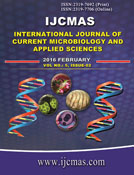


 National Academy of Agricultural Sciences (NAAS)
National Academy of Agricultural Sciences (NAAS)

|
PRINT ISSN : 2319-7692
Online ISSN : 2319-7706 Issues : 12 per year Publisher : Excellent Publishers Email : editorijcmas@gmail.com / submit@ijcmas.com Editor-in-chief: Dr.M.Prakash Index Copernicus ICV 2018: 95.39 NAAS RATING 2020: 5.38 |
Psoriasis is a chronic inflammatory disease characterized by number of immune regulatory abnormalities. Cytokines are small, biologically highly active proteins that regulate the growth, function, and differentiation of cells and help directing the immune response and inflammation, contribute to the induction or persistence of the inflammatory processes in psoriasis. Intensive research is ongoing to understand the mechanisms involved in the development of psoriasis and offer new treatment options for patients suffering from this disease. This study was conducted to evaluate serum IL-18, TNF-α and hs-CRP levels among Iraqi psoriatic patients and to assess their relation to disease severity depending on Psoriasis Area and Severity Index (PASI). A 65 patients with psoriasis (42 females and 23 males), with mean age (35±13) years old, and 25 apparently healthy volunteers (15 females and 10 males) with no symptoms or history of psoriasis or other allergic or skin disorders (control group) were conducted in this study. Patients were divided into two groups according to the severity of their psoriasis, 20 cases diagnosed as moderate psoriasis (PASI Ë‚ 15) and 45 cases diagnosed as severe (PASI ≥ 15). The results demonstrated significant elevation of IL-18, TNF-α and hs-CRP levels in both groups of psoriatic patients compared with control group, and a significant positive linear correlation was found between IL-18, hs-CRP and severity of the disease. These results identify IL-18 and hs-CRP as mediators in the pathogenesis of psoriasis and can be considered as useful markers to assess psoriasis and may be considered as useful follow-up markers for monitoring patients with psoriasis.
 |
 |
 |
 |
 |